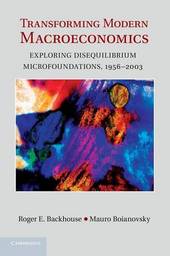
|
Transforming Modern Macroeconomics: Exploring Disequilibrium Microfoundations, 1956-2003
Paperback / softback
Main Details
| Title |
Transforming Modern Macroeconomics: Exploring Disequilibrium Microfoundations, 1956-2003
|
| Authors and Contributors |
By (author) Roger E. Backhouse
|
|
By (author) Mauro Boianovsky
|
| Series | Historical Perspectives on Modern Economics |
|---|
| Physical Properties |
| Format:Paperback / softback | | Pages:238 | | Dimensions(mm): Height 229,Width 152 |
|
| Category/Genre | Macroeconomics
Economic history |
|---|
| ISBN/Barcode |
9781107435384
|
| Classifications | Dewey:339 |
|---|
| Audience | | Professional & Vocational | |
|---|
| Illustrations |
13 Line drawings, unspecified
|
|
Publishing Details |
| Publisher |
Cambridge University Press
|
| Imprint |
Cambridge University Press
|
| Publication Date |
7 August 2014 |
| Publication Country |
United Kingdom
|
Description
This book tells the story of the search for disequilibrium micro-foundations for macroeconomic theory, from the disequilibrium theories of Patinkin, Clower and Leijonhufvud to recent dynamic stochastic general equilibrium models with imperfect competition. Placing this search against the background of wider developments in macroeconomics, the authors contend that this was never a single research program, but involved economists with very different aims who developed the basic ideas about quantity constraints, spillover effects and coordination failures in different ways. The authors contrast this with the equilibrium, market-clearing approach of Phelps and Lucas, arguing that equilibrium theories simply assumed away the problems that had motivated the disequilibrium literature. Although market-clearing models came to dominate macroeconomics, disequilibrium theories never went away and continue to exert an important influence on the subject. Although this book focuses on one strand in modern macroeconomics, it is crucial to understanding the origins of modern macroeconomic theory.
Author Biography
Roger E. Backhouse is Professor of the History and Philosophy of Economics at the University of Birmingham, where he has taught since 1980, and at the Erasmus University Rotterdam. In 2007 he was Ludwig Lachmann Research Fellow in the Department of Philosophy at the London School of Economics. He currently holds a Leverhulme Trust Major Research Fellowship. He is the co-editor (with Philippe Fontaine) of The History of the Social Sciences since 1945 (Cambridge, 2010) and The Unsocial Social Science? Economics and Neighboring Disciplines since 1945 (2010) and (with Bradley W. Bateman) of The Cambridge Companion to Keynes (Cambridge, 2006). He is co-author (with Bradley W. Bateman) of Capitalist Revolutionary: John Maynard Keynes. He is author of The Puzzle of Modern Economics, The Ordinary Business of Life and The Penguin History of Economics. He has written for a number of journals including Economica, the Journal of Economic Perspectives, History of Political Economy, the Journal of the History of Economic Thought and the Journal of Economic Methodology. He has been review editor of the Economic Journal, editor of the Journal of Economic Methodology and associate editor of the Journal of the History of Economic Thought. Mauro Boianovsky is Professor of Economics at Universidade de Brasilia, where he has taught since 1996, when he obtained his PhD from the University of Cambridge. He is the editor of Business Cycle Theories: Selected Texts, 1860-1939 (2008) and co-editor (with Kevin Hoover) of Robert Solow and the Development of Growth Economics (2009). He has written for a number of journals including History of Political Economy, the Cambridge Journal of Economics, the European Journal of the History of Economic Thought, Structural Change and Economic Dynamics and the Journal of the History of Economic Thought. Professor Boianovsky has been on the advisory board of History of Political Economy, the European Journal of the History of Economic Thought, Cahiers D'Economie Politique and the Journal of the History of Economic Thought. He has been awarded best article prizes by the History of Economics Society (1999, 2007) and the Brazilian Economic Association (1996, 1998, 2011).
Reviews'Roger Backhouse and Mauro Boianovsky provide a fascinating, lively and meticulously researched account of the quest for non-Walrasian microfoundations of macroeconomic theory, from the efforts of Don Patinkin, Robert Clower, and Axel Leijonhufvud to understand Keynesian economics in terms of quantity constraints and coordination failures to recent attempts to incorporate imperfect competition in dynamic stochastic general equilibrium models. This book belongs on the shelf of anyone interested in modern macroeconomics and its history.' Robert W. Dimand, Brock University 'For the real story of how macroeconomics got to its present state, you need to read this book. Backhouse and Boianovsky do a beautiful job of untangling a complicated literature that others have found convenient to forget.' Peter Howitt, Brown University '... this is a very nice book written by two specialists on the history of macroeconomics, and one that brings to the fore a crucial development that transformed the area: the disequilibrium literature.' Pedro Garcia Duarte, Journal of the History of Economic Thought
|